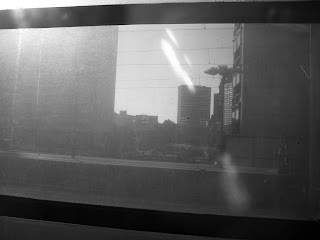


Ich verstehe nicht. Ich verstehe nichts. The simple difference. I walk in the morning and order ein Milchkaffee und ein Croissant, bitte.




Afterwards to Savignyplatz, take the train, Zoologischer Garten, Tiergarten, Bellevue, Hauptbahnhof, Friedrichstr, Hackescher Markt—the alte Kirche, der Engel, der Reichstag, das Fernsehentor—“ein Milchkaffee und ein Croissant”, bitte, Goethe Institut... ich bin hier.
 Englisch, Deutsch, Italien, Spanisch, Deutsch… ich verstehe nicht. Nothing that simple. And yet…
Englisch, Deutsch, Italien, Spanisch, Deutsch… ich verstehe nicht. Nothing that simple. And yet…Samstag, ich nehme meine Kamera und… Tiergarten—nicht, viele Leute—Friedrichstr—nicht, man kann nicht hier herunterkommen—Hackescher Markt—noch einmal, ja, hier… you walk until you find the big Architekturbüchergeschäft, “die Phänomenologie des Geists”, Hegel, Kant, Benjamin, oder Foucault, Kristeva… Judith Butler is big in Germany… big in Japan?, auch?


What do you hear here? “and all your dreams are falling down… all your dreams are over now…” Träume? Du bist in Berlin. Traumen. What is the root? Thus you walk. In ignorance. Was ist (das) in Deutsch? Unwissenheit. Nothing that simple. Noch einmal, wiederholen, ich wiederhole (mich). Spur.


But you had a great dinner, and in Alexanderplatz a Polen came next to you and asked you for a cigarette. You gave him one, and he asked you:
-Deutsche? (wrong)
-nein, mexikanisch…
-ich bin… Polen… (Pollen, Blütenstaub… three four bees in front of your window, on the flowers, in the flowers… This is what language is for…)
(you wished you had given him all your cigarettes, but you gave him only one). (“All your dreams are over now” “worrying and wondering” “all your dreams have falling down”)
He said something—der Engel—you need Polish to understand, nicht wahr?


11:51 PM. Too late. Aber hier ist es Berlin. Was? Ich verstehe nicht. Nichts.
Wrong word order. Is there an order? In der Stadt. This is the city. Enough. You can do your exercise still.
 Another day. You want to be honest. Today you didn’t feel that you could speak any language at all—let alone German. Everyone here is very kind, except for the cashier at the supermarket. He chats and chats (in the hardest German you’ve ever listened) and when you come, he says nothing and drops your change on the counter.
Another day. You want to be honest. Today you didn’t feel that you could speak any language at all—let alone German. Everyone here is very kind, except for the cashier at the supermarket. He chats and chats (in the hardest German you’ve ever listened) and when you come, he says nothing and drops your change on the counter. Go back to what you know: “Si vous me suivez, nous pourrons aller très loin. La question n’est pas de savoir jusqu’où on peut aller, la question est de savoir si on sera suivi. C’est là en effet un element discriminatif de ce qu’on peut appeler la réalité.” Lacan, 1954.
Go back to what you know: “Si vous me suivez, nous pourrons aller très loin. La question n’est pas de savoir jusqu’où on peut aller, la question est de savoir si on sera suivi. C’est là en effet un element discriminatif de ce qu’on peut appeler la réalité.” Lacan, 1954.



Thus we get lost. Which for a longtime you have considered a good thing. And, you repeat yourself, this is the city. You repeat that to your self, as you walk, as you wake up, and sometimes even as you write (perhaps when you dream?). For some days, eight weeks, you belong to this city, you are part of its possessions, another element in the night of Berlin and on the S-Bahn. You keep that camera with you (colour of bubble gum), and with your 5 to 10 sentences try to defend from the corners, the lines and the doors.


You see, this is not a museum. Even with your camera, your notebook and your Goethe-Institut pin, you have stopped being the obvious tourist. You better review those pictures… In the city, you find yourself, with a plate in front of you, you recognize and actualize your omnivorous tendencies. “Wherever I go, I eat well”. (You light your pipe again).
 A ver, recapitulemos (funny verb in Spanish, pas le même que ‘capituler’ en Français… quoiqu’il y ait quelque chose de ça au-dedans…): you’re Mexican, you have here two québécois friends, a Swedish, a British and a French… although all their stories are interesting enough to put quotation marks around these adjectives. You go and eat “Mexican food” in Deutschland. Danach, Essen von München, Italianisch…
A ver, recapitulemos (funny verb in Spanish, pas le même que ‘capituler’ en Français… quoiqu’il y ait quelque chose de ça au-dedans…): you’re Mexican, you have here two québécois friends, a Swedish, a British and a French… although all their stories are interesting enough to put quotation marks around these adjectives. You go and eat “Mexican food” in Deutschland. Danach, Essen von München, Italianisch…Deine Schwiegermutter kommt, dich zu besuchen, und das ist ein bisschen dein Heimat, ein Teil. Nos veremos en Berlín—all that resonates with these words.



 You get again lost. As if the event was too big, or perhaps there wasn’t any place for the event. “Ein Milchkaffe, und… err… ein Croissant, ja, zu… zu mit nehmen, bitte”.
You get again lost. As if the event was too big, or perhaps there wasn’t any place for the event. “Ein Milchkaffe, und… err… ein Croissant, ja, zu… zu mit nehmen, bitte”.



 Where are you? On the train. In dem Zug? Du gehst nach Hause. Nobody looks at you, and that is nice. That reminds you, tu te souviens, ouais, au Mexique. Heimweh (Wortschatz): ich habe Heimweh nach dir, Liebe Nena.
Where are you? On the train. In dem Zug? Du gehst nach Hause. Nobody looks at you, and that is nice. That reminds you, tu te souviens, ouais, au Mexique. Heimweh (Wortschatz): ich habe Heimweh nach dir, Liebe Nena.

Keine Kommentare:
Kommentar veröffentlichen